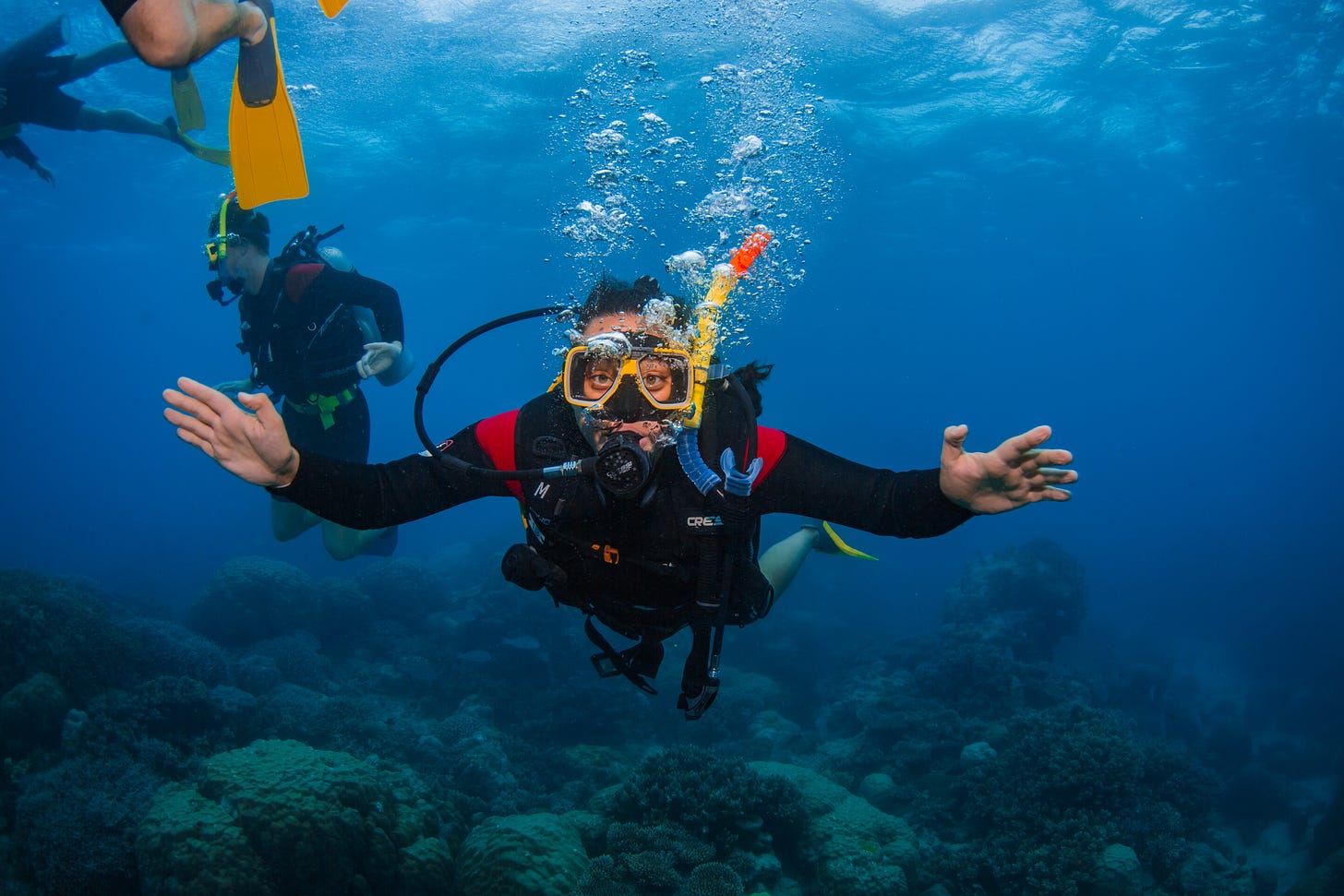The Common Thread Between Scuba Diving and Shaolin Kung Fu Training
Shared wisdom from a Spanish scuba instructor in Australia and a Chinese Shaolin master in Germany.
None of us are strangers to life’s extreme highs and severe lows. One moment we are basking in the nice compliment someone gave us, and the next we are crushed by a blow of criticism. If we don’t learn to re-center, it’s easy to spend our lives in the exhaustive cycle of highs and lows without ever achieving a balanced state.
Scuba Lessons
The lightbulb moment came to me while masked up with scuba gear several meters underwater in the Great Barrier Reef off the coast of Australia. With a giant oxygen tank on my back and a regulator in my mouth, I was moving around clumsily keeping a watchful eye on our scuba diving instructor, Bernardo.
Bernardo and his Catalonian Spanish gestures would signal to us to “equalize” as we descended on our dive. In diving, “equalizing” means adding air to the spaces in our bodies that are getting squeezed by the pressure as we go down.
He explained that the lungs are the most important to equalize. To equalize them, we just have to keep breathing.
“Breathe. Breathe. It’s the number one most important thing, but it’s also the first thing people forget.” Bernardo drilled into us on the deck of the boat before we dove.
Because our bodies and minds are not used to breathing underwater, our instinct is to hold our breath. But that’s the most dangerous thing because the pressure can crush our lungs if we don’t use them. While it may feel strange, the most important thing once we hit the water is to remember to breathe.
Second, we had to equalize our noses and sinuses. To do this we had to swallow or pinch our nose and blow out so that our ears could pop and balance out the pressure. If we don’t equalize, we cannot continue the dive.
It was a constant battle telling my brain to breathe underwater and remind myself to pop my ears. I’d forget to do it so I had to watch Bernardo who would signal to us every few seconds as a reminder to equalize.
Throughout the dive, the words “equalize” were drumming in my head. At one point, however, I realized they were a distant echo of something Shaolin master Shi Heng Yi (Shifu) told us back at the temple in Germany. “Regulate,” he had said.
Shaolin Kung Fu Lessons
A few months prior, some friends and I had been training at the Shaolin Temple Europe. As part of the training session, Shifu had us go through rounds of intense exercises that had our hearts pounding and legs shaking, followed by a few minutes of regulating, where we’d draw our hands near our hearts and take a few slow breaths. Then we’d repeat. Each time after the intense exercises, we’d slow our breaths and he’d say, “Regulate.”
Later, over tea, Shifu shared that in life we will inevitably experience times of pressure, stress, high adrenaline, or rock bottoms. But no matter if we face the highest highs or lowest lows, the important thing is that after we experience them, we must re-center. We must regulate. Or in Bernardo’s words, equalize.
Whenever there is an imbalance, we must find balance. Shifu gave us the example that if someone compliments us, we can receive it and then return to balance. If someone insults us, we take it but then we return to balance.
This way, nothing throws us out of balance for too long. We strive to be in an equalized state as much as possible. It’s not to say we shouldn’t experience highs or lows. It just means we can accept those and then come back to center.
Breathe, Equalize, Regulate
Just as Bernardo said in diving the most essential thing is to remember to breathe and equalize, it’s the same with the Shaolin training we did. We had to breathe through the pain of the conditioning. Breathe through the low squats with shaking legs. Breathe through our hearts pounding and faces sweating. Then we used the breath to slow us down and re-center.
If the practices of equalizing and regulating help us dive into the depths of the ocean or train in Shaolin Kung Fu, these practices also translate to our daily lives.
If we feel anger, we can use the breath to let it go and re-center. If we experience an epic day filled with euphoria, we can enjoy it but also must let it go and find a state of balance again.
When a boxer throws a punch, they throw it but then immediately return to center. The same goes for life. We must always be at the ready, but never forget to breathe, equalize, and regulate.







Breathe, equalize, and regulate--the formula for equanimity. The way to mindfully respond to life and not just react.